The
PhotoDrama of Creation
Section 2
Expulsion
From Eden
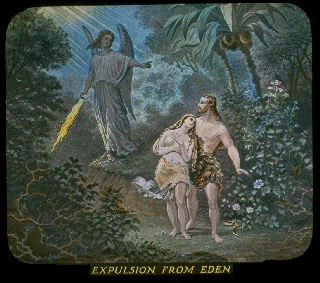
The
Word of God must stand, whether it be the word promising
Eternal Life or the sentence of Death. There is no variableness
with Him, neither shadow of turning. The curse, the Death
Sentence, foretold by the Lord, was executed, but not
instantly. Adam was not stricken lifeless with a thunderbolt.
From the very beginning God foreknew all, and had planned
the redemption of Adam, Eve and their children. To this
end Jesus came and "died, the Just for the unjust."
As a result ultimately the curse of death will be removed.
"There shall be no more curse"--no more dying,
sighing, or crying, nor any more pain.--Revelation 22:3;
21:4,5.
All
of us were told, and many of us believed fully, that the
penalty of Father Adam's disobedience was eternal torture,
in which all of his posterity must share, except a few--the
saintly, the Elect. Told that this was the teaching of
the Bible, we accepted without proof.--1 Thessalonians
5:21.
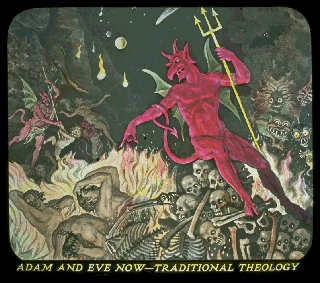
Now
Christian people examine their Bibles more carefully.
They find that the curse, or penalty for sin, is a totally
different one. "The wages of sin is death."
(Romans 6:23.) "The soul that sinneth it shall die."
This penalty of death has rested against Adam and his
family for six thousand years. It has brought sorrow,
sighing, pain and trouble; it has blighted our lives mentally,
morally and physically.--Romans 5:12.
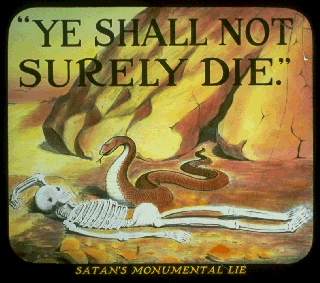
It
is this curse of death that was pronounced against Father
Adam, according to the Genesis account, and also according
to the New Testament. "Accursed is the earth for
thy sake; thorns and thistles shall it bring fourth unto
thee. In the sweat of thy face shalt thou eat bread until
thou return unto the ground from whence thou wast taken,
for dust thou art and unto dust shalt thou return."
It is from this curse that Jesus redeemed us by dying,
the Just for the unjust. It is from this death-curse that
Messiah rescues all by a resurrection from the dead. "By
man came death, by man also the resurrection of the dead."--1
Corinthians 15:21.
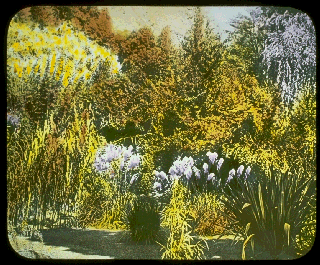
Pride-Jealousy-Anger-Murder
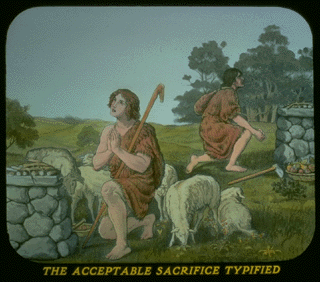
No
children were born to Adam and Eve in Eden. They labored
with sweat of face for quite a time before their first-born
came. Doubtless he was birth-marked with a jealous, unhappy
disposition. Toil conduced to fretfulness in those who
knew a happier lot in Eden. Fault-finding with each other,
resentment against the Creator, discontent with their
lot, probably marked their offspring--Cain. The world
has since been under a "reign of Sin and Death."
Daughters
also were born to them, and later another son, Abel, of
a very different disposition from their first-born. The
experiences of life may have mellowed their hearts. They
remembered an intimation of hope connected with their
sentence; namely, that the Seed of the woman should bruise
the serpent's head. Abel's disposition indicates that
he had a contrite heart, and desired to please God. If
parents realized to what extent mental conditions affect
their offspring, all would strive to bestow favorable
birth-traits on their children.
Years
passed. Cain and Abel were inspired by the promise respecting
the Seed of the woman, and the hope for recovery by Divine
favor. They approached the Lord with offerings to receive
a blessing. Abel's sacrifice of animal life God accepted,
because it typified the necessity for Jesus' death as
the basis for forgiveness of sin. God's rejection of Cain's
offering teaches that without shedding of blood there
can be no remission of sins. Cain should have procured
an animal for acceptable sacrifice, in obedience to the
Divine will. Instead, he allowed anger, malice, hatred,
and strife to burn in his heart, and became a murderer.--Genesis
4:5-8.
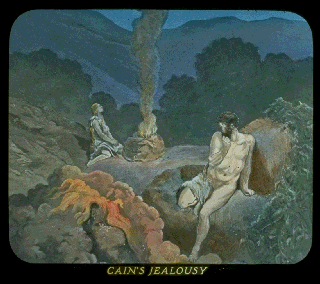
St.
Paul says that Abel's blood cried to God for justice against
Cain. But Jesus' blood cried to God for mercy on the sinner.
Every injustice cries to God for justice. By a special
covenant, Jesus and His Elect Church lay down their lives
sacrificially for Adam and his race. (Romans 12:1.) The
"better sacrifices" completed, Restitution follows.
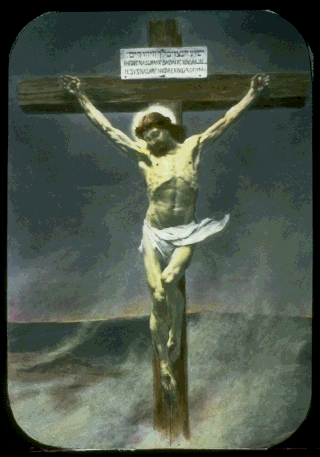
Abel
the First Martyr
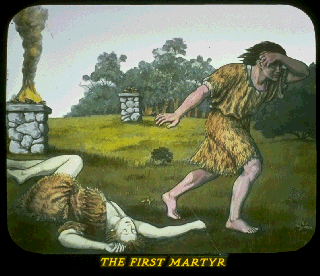
The
word "martyr" signifies witness, and is particularly
used in reference to those who witness to the Lord's cause
faithfully, at the cost of suffering or death. Abel has
the distinction of being God's first martyr. It is very
remarkable that nearly all the martyrs have suffered at
the hands of "brethren." Thus Jesus and the
Apostles received their persecution chiefly from Jewish
brethren, sharers of the same blessed hopes and promises.
(John 16:2,3.) How strange that it should be thus!
Similarly,
during this Gospel Age, Christians have suffered martyrdom
at the hands of fellow Christians. Thus the Scriptures
foretold, saying, "Your brethren that hated you and
that cast you out, said, "The Lord be glorified.
But He shall appear to your joy, and they shall be ashamed."Every
martyr, in proportion to his faithfulness, will ultimately
receive a crown of life, while all persecutors will ultimately
be ashamed.
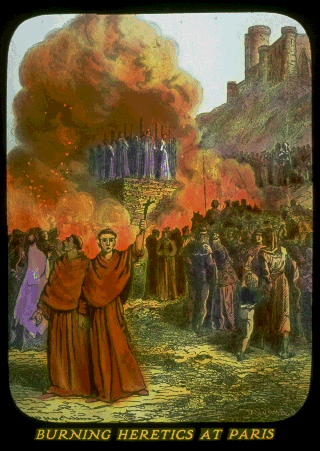
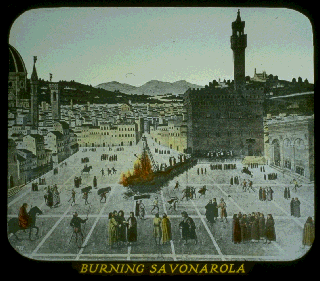
The
reign of Sin and Death continued for four thousand years
before God sent His Son into the world to be its Redeemer
and Deliverer. The Redeemer will set it free from bondage
to Sin and Death, but He could not do so unless first
He paid the death penalty--dying, the Just for the unjust.
During those four thousand years vague promises were given
from time to time. But no start was made to fulfil them
until Jesus appeared. Even those vague promises were confined
to the Jewish nation. Outside nations, the Gentiles, received
no promises of relationship to God. They were condemned
sinners, and no hopes were held out to them. As St. Paul
says, they were without hope--"being aliens from
the commonwealth of Israel, and strangers from the covenants
of promise, having no hope, and without God in the world."--Ephesians
2:12.
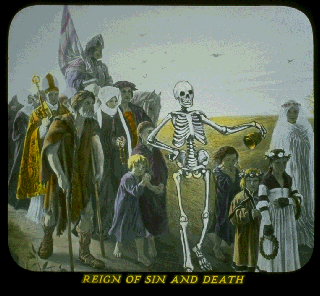
For
six thousand years, according to St. Paul, we have had
a reign of Sin and Death. Christians are still praying
for the blessed Day of Messiah, for Satan's binding. Then
blessings will displace sin, sorrow and death.--Revelation
21:4.
Sorrow
and Mourning Begun
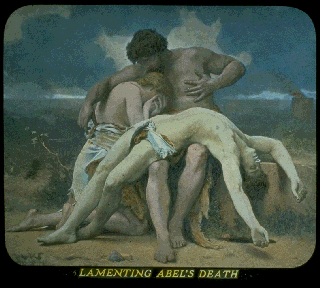
The
first death in Adam's family must have cast a great shadow.
The hope centered in the Divine promise that the Seed
of the woman should bruise the serpent's head was temporarily
snuffed out. Shortly after, Seth was born. His name indicates
that his parents hoped that he would be the man promised
of the Lord--not seeing that the promised One would be
the Messiah, who would come long afterward, and for whose
work the world still waits.
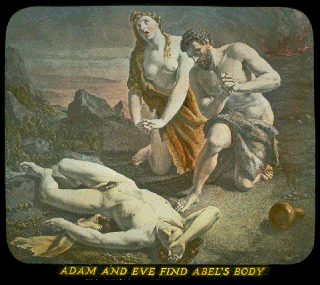
Although
we speak of this as the first death, we must not forget
that from the Divine standpoint Adam and his race were
already dead, in that none can regain everlasting life
except through the Redeemer's work of Sin-Atonement.
At
present the population of the world consists of sixteen
hundred millions, ninety thousand dying every day.
It
is undoubtedly fortunate for our fallen race that we cannot
appreciate deeply the sorrows and difficulties of others.
Each individual, each family, has about as large a share
of sorrow as it can properly bear. Indeed, the poet, realizing
the folly of unrestrained grief, has well sung,
"Go
bury thy sorrow,
The world has its share,
Go bury it deeply,
Go hide it with care."
Hope,
joy and peace come to us through the Divine promise that
the time is coming when there shall be no more sorrow
or dying, no more sin or pain. For Messiah's Kingdom shall
conquer Sin and Death and cause God's will to be done
on Earth as fully as it is now done in Heaven.--Matthew
6:9,10.
Our
experiences with Sin and its penalty should make us all
sympathetic. We should do nothing to add to the sorrow
of others, but everything to relieve. The words of Jesus
touch this chord of sympathy, "Come unto Me, all
ye that labor and are heavy laden, and I will give you
rest." There is no rest for the weary of heart except
in union with Christ.
Sons
of God, Daughters of Men
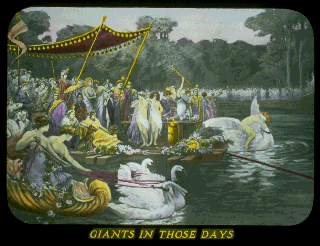
Long
before man's creation, angels were created, yet sin was
unknown until Adam's day. The beginning of sin, according
to the Bible, was in the Garden of Eden. Lucifer, an angel
of very high rank, had long cherished in his heart ambitious
designs. If opportunity ever offered he would show God
and the angels his grand schemes. His thought is expressed
by the Prophet: "I would ascend above the stars [angels],
I would be as the Most High"--an Emperor.When Lucifer
beheld the first human pair, he was tempted to try his
experiment. They were a new order of beings in God's moral
image. They had procreative powers, which no angel possessed.
Their offspring filling the Earth would be his subjects,
through whom he would work out his ambitious schemes.
Thus Lucifer became Satan--God's opponent.--Isaiah 14:12-14.
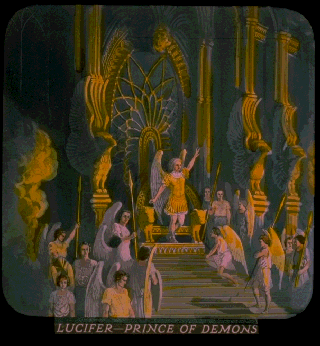
All
the holy angels were bewildered. His was the first rebellion
against the Almighty's laws. No punishment followed, and
the angels queried whether or not God was able to enforce
His laws. Centuries rolled on; the human family was wasting;
God's penalty, "Dying, thou shalt die," was
gradually being enforced. Satan realized that his kingdom
of dying subjects would make but a poor showing ever.
He conceived a plan to outwit God and develop a new order
of beings--hybridized humans, infused with superior vitality.
The
angels possessed a God-given power of materialization.
They could appear in human bodies resembling those of
men. The Bible attests this. (Genesis 18.) The angels
were permitted contact with the fallen race to prove whether
they could bring mankind back to God.--Hebrews 2:5.
The
record of Genesis 6:2-5 is that the "sons of God
saw that the daughters of men were fair, and they took
unto themselves wives of all they preferred." Thus
the angels became the fathers of a new race, distinct
from Adam's. The record is that these were giants, physically
and intellectually--"men of renown," who filled
the Earth with violence.
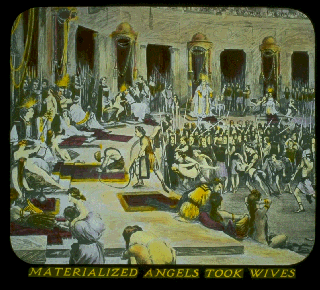
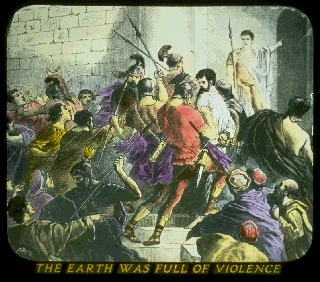
While
the Ark was Preparing
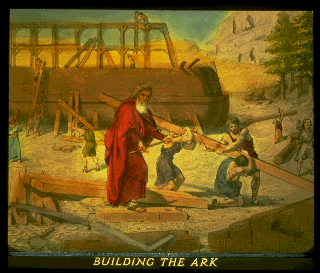
The
disloyal course of the angels apparently continued for
centuries without any outward manifestation of God's ability
to check them. Thus all the holy angels were tested, and
all who chose "were disobedient in the days of Noah."--1
Peter 3:20.
Noah's
family was singled out as exceptional, in the statement,
"Now Noah was perfect in his generation"--implying
that few or no others were perfectly generated--of pure
Adamic stock. (Genesis 6:9.) Noah's family, therefore,
included all the uncontaminated--only eight persons. They,
by Divine command, built the Ark, and thus witnessed to
the world the Divine intention respecting a Deluge.
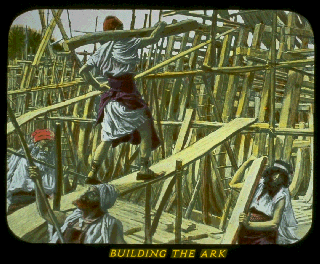
Noah's
message respecting a Divine judgment by a Deluge seemed
ridiculous. Until the Deluge there was no rain. The last
of the great "rings" which then flooded the
Earth was of pure water. For centuries it was spread out
over the firmament. The whole Earth was a great hothouse.
There were practically no changes of seasons, nor storms,
because the great water canopy preserved it in perpetual
Summer. Of that period we read: "For as yet there
was no rain on the Earth." (Genesis 2:5.) Noah, the
preacher of righteousness, was mocked and considered a
fool because of his faith in God's Word, just as others
of the Lord's people at various times have been mocked
by those who lacked faith, and are yet mocked.
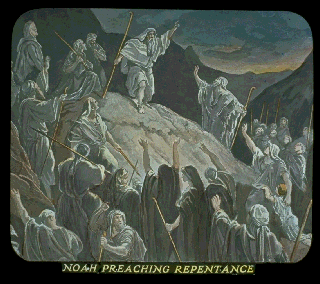
Finally,
the Deluge came. "The fountains of the great deep
[canopy] were broken up." The breaking of the canopy
precipitated millions of tons of water at both poles,
forming two great tidal waves, covering the Earth for
a great depth, deepening the ocean beds, and throwing
up additional mountains.
The
cradle of the world is supposed to have been in Armenia.
Geology tells us that the land of that vicinity was at
one time a quiet settling pond, as evidenced by heavy
alluvial deposits. In this vicinity the Ark floated, and
by Divine protection landed on Mt. Ararat its precious
freight for the world's new start.
Nephilim
Destroyed
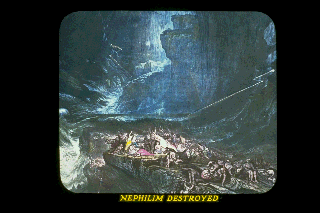
The
account of the fall of the angels from being sons of God
to be demons helps us to understand why God decreed the
Deluge to wipe out all of the human race except Noah and
his family. We perceive that God from the first intended
to deal only with Adam and his family. The giant sons
of the fallen angels (Nephilim) came into being contrary
to the Divine will; hence, properly, no provision was
to be made for them. They never had a right to life, nor
will they have a resurrection. On the other hand, all
of Adam's posterity, redeemed by Jesus' death, must be
recovered from death, with full opportunity to secure
everlasting life.
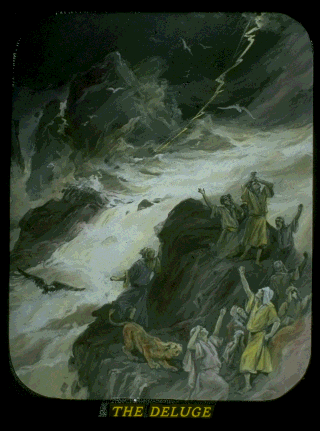
After
the Deluge, the demon angels dematerialized--resumed their
spirit conditions. St. Peter and St. Jude reveal the penalty
inflicted upon them. "Those angels which kept not
their first estate, but left their own habitation [spirit
condition], God restrained under chains [restraints] of
darkness, unto the Judgment of the Great Day."--2
Peter 2:4; Jude 6.
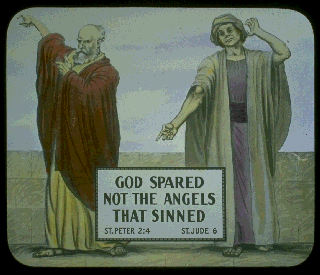
The
liberties of the fallen angels--demons--were restrained.
They are unable to use deceptions in the light--unable
to materialize as formerly. Note, however, that the limitation
"unto" implies that when the "great Day
of Wrath" shall come, these fallen angels will be
permitted to materialize and become potent factors in
the strife. Other Scriptures indicate that these fallen
angels will have much to do with the great "time
of trouble" with which this Age will close, and in
which Messiah's Kingdom will be inaugurated.
These
fallen angels were cast to tartarus--our Earth's atmosphere.
Satan, a cherub-angel of higher rank, is styled the Prince
of Demons. They are not in some far-off place stoking
fires, but keep as close to humanity as possible. Not
permitted to materialize, they seek to obsess, to demonize
by clairvoyance and clairaudience. Mankind would properly
resent them if their true character were known. They therefore
personate the dead, communicating through spirit-mediums.
The
End of That Age
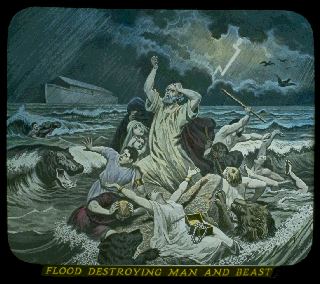
In
the Scriptures, the expression "End of the World"
is frequently used. St. Peter tells us that the world
came to an end in the Deluge. It was not the Earth which
came to an end; merely that order or condition of things
which prevailed prior to the Deluge ceased there. A new
world, a new order of things, was there ushered in. This
is in strict accordance with the proper translation of
the Greek. The common translation unfortunately has deceived
many. We would better read "End of the Age"--not
End of the World.
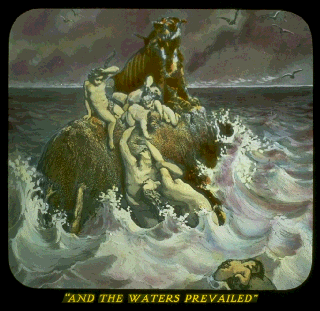
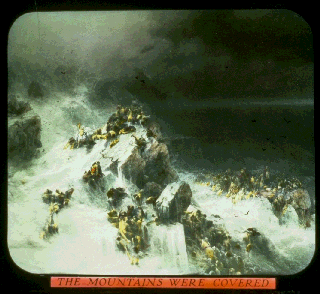
Ages
may end and be succeeded by other ages, but the Bible
declares that "the Earth abideth forever;" that
"God formed it not in vain; He formed it to be inhabited."
It has never been thoroughly habitable, nor has it ever
been inhabited, in the proper sense of the term. The work
of Messiah's Kingdom will be to make God's footstool glorious,
and fit for those restored to His favor. His further work
will be to uplift man and restore him to all that was
lost in Eden and redeemed at Calvary. He will destroy
only the incorrigible.
In
the new order of things started by Noah and his family,
God allowed humanity to have its way and to work out its
own schemes without Divine interference, except in extreme
cases. He allowed the world to learn lessons, while He
carried out His own great Plan, of which Redemption is
the center, and Messiah's Kingdom the circumference, for
the recovery of mankind from their fallen estate.--Romans
5:12-14.
The
development of God's Plan has been long from the human
standpoint, but not so from the Divine, for we read: "A
thousand years in Thy sight are but as yesterday;"
and again, "A day with the Lord is as a thousand
years." During six of these thousand-year Days, in
which He rests or desists from interfering with the world's
affairs, God has permitted a reign of Evil, but His arrangements
are complete whereby Messiah, the Redeemer, will fully
restore all the willing and obedient to all that Adam
forfeited.--Acts 3:19-22.
The
Rainbow Pledge
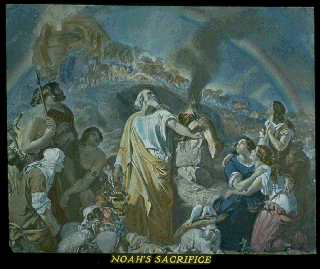
When
Noah and his family came out of the Ark, they acknowledged
God by offering to Him a sacrifice, and God pledged the
Rainbow as a sign that He would never again destroy mankind
by a flood of waters. A rainbow was never seen before
that time, for the reason given in the Bible; there had
been no rain. Furthermore, the Sun's rays did not directly
strike the Earth, but merely through the canopy, with
much the same effect as that of a hothouse.
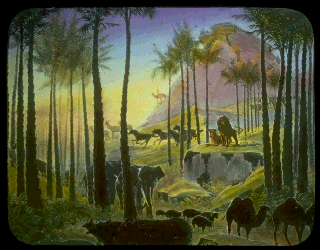
Many
changes were brought about by the removal of the canopy--rains,
floods, droughts, thunder-storms, tornadoes, extremes
of heat and cold. These things were impossible under the
canopy. Noah's intoxication is accounted for along these
lines. The juice of the grape had not previously fermented.
Hence Noah could not have known of its intoxicating effect.
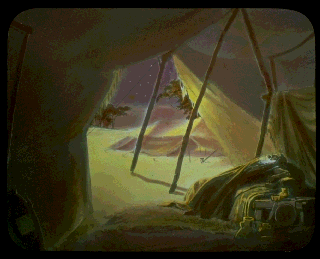
With
the collapse of the watery envelope, came the extreme
heat of the tropics and the extreme cold of the polar
regions, before the ocean currents modified them.
The
change must have been almost instantaneous. We have proofs
of this. In northern Siberia an antelope was found imbedded
in ice. It had green grass in its stomach, which proved
that its death occurred suddenly while it was feeding.
Similarly, a mastodon was found imbedded in ice with food
between its teeth. Thus is demonstrated that the poles
were once as equable as the temperate zone, and that in
a moment came such a change as could be brought about
only by the breaking of the canopy. The great glaciers
and heavy ice of the Arctic regions, formed thus suddenly,
have existed for centuries. The water did not all congeal
into ice, but like a tidal wave carried great glaciers
and boulders across the North American continent, and
Northwestern Europe, as scientists have clearly traced.
They cut through hills with such force that they have
left their mark for all time. Equatorial currents, the
Gulf Stream and the Japan Stream have since thawed out
much of the polar ice.
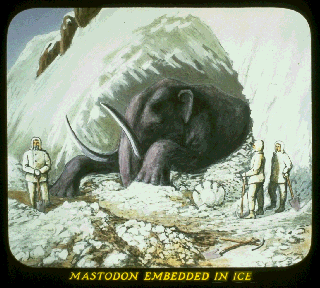
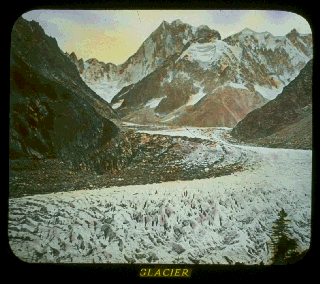

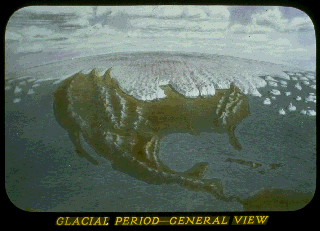
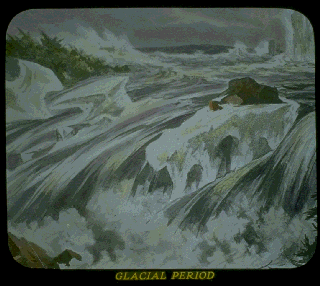
Demigods
of Greece and Egypt
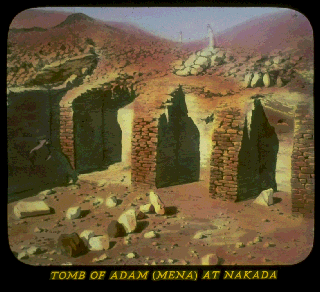
Long
have the learned wondered what foundation Grecian Mythology
might have had. Now, taking heed to the sure Word of God,
we perceive that the angels who materialized before the
Flood were the gods of Mythology, while their offspring,
the giants, were the demigods. The suggestion may well
start a flood of reflection in thinking minds.
Egyptologists
have been astonished by their findings in the tombs of
the Pharaohs. In some of these, historic tablets have
been found, tracing the ancestry of the Pharaohs apparently
back to Creation--the first Pharaoh--Adam. But these tablets
show so many more generations than the Bible record that
Egyptologists lose all faith in the Genesis account. They
become Higher Critics, discount the Bible record and pin
their faith to the Egyptian tablets. They confess, however,
that these tablets vary, and more or less contradict each
other. Concededly, the most accurate is THE ABYDOS TABLET,
found in the sepulchre of Seti I.--probably the Pharaoh
who made Joseph his Prime Minister and who is supposed
to have died about 120 years before Moses was born.
The
chief fault found with this Tablet is that it is not so
lengthy as some of the others. Nevertheless, Pharaoh,
Seti I., preserved this Tablet for us with great care.
He sank a shaft sixty feet deep through solid rock. At
that level his masons cut out the stone staircase on which
THE ABYDOS TABLET is portrayed. An exact copy of it is
to be found in the British Museum. At considerable expense
and with difficulty we have secured the photograph of
it, which we here present. Our object is to show that
this best of Egyptian records fully corroborates the Genesis
account.

This
list of Pharaohs is shorter than the others because it
omits the names of gods and demigods. It is the complete
Egyptian record of the purely human line of rulers back
to Adam. Furthermore, these omissions occur at the appropriate
place--at the time of the Deluge.
|
